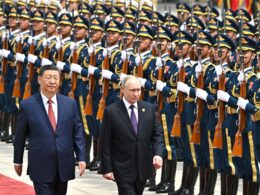The extent to which Vladimir Putin upended the international order by his illegal seizure of Crimea is becoming ever more obvious: Now Chinese officials are citing the Kremlin leader’s actions there – and implicitly the West’s failure to block him – as reasons for thinking that they can do the same in Southeast Asia, according to a Russian analyst.
In a commentary on the Svobodnaya pressa portal today, Andrey Ivanov says that Beijing “wants to repeat the success of [Russia’s] Crimean scenario in Southeast Asia” and then offers the comments of Aleksey Maslov, a senior orientalist at Moscow’s Higher School of Economics, in support of his argument.
Following the Hague Court’s ruling against it concerning the islands in the South China Sea, Ivanov points out, Beijing’s rhetoric has become ever clearer about China’s intention to use whatever means are necessary to defend what it views as its sovereign territory, including the use of military force, which could lead to a major war.
Maslov agrees and makes an argument which, although he does not acknowledge it, underscores some additional parallels between Beijing’s posture now and that of Moscow prior to its invasion of Ukraine in 2014 by suggesting that China had to react to the Hague decision because of its increasing economic and social problems at home.
Maslov says that he does not think that anyone “really wants to fight” because “any military actions in the area of the disputed islands would throw China back many years” and force China to change its approach in a major way because “China from a peaceful state would be transformed into a state ready to fight.”
What all this is about, Maslov says, is that “China wants to show itself to be a military power.”
Maslov’s key observation is this: “China has very carefully looked at the Ukrainian problem, at how Russia resolved it and at what has been the reaction of international public opinion.” That is because “China wants to do something similar” so that Beijing will look both prescient and powerful.
He then says that he “fears that precisely this attempt to repeat the Russian experience could lead to a prolonged conflict.” Such a conflict could grow into a much larger one, although it is “extremely” unlikely that it could trigger a third world war, Maslov says, given that there aren’t any countries in the region interested in or capable of fighting one.
The country that might benefit from such a conflict the most would be the United States, the Moscow orientalist says, because then Washington could portray China as “an aggressive country” and thus a danger, against which countries of the region should be united with the US. There is some evidence that the US is encouraging such feelings, he concludes.








